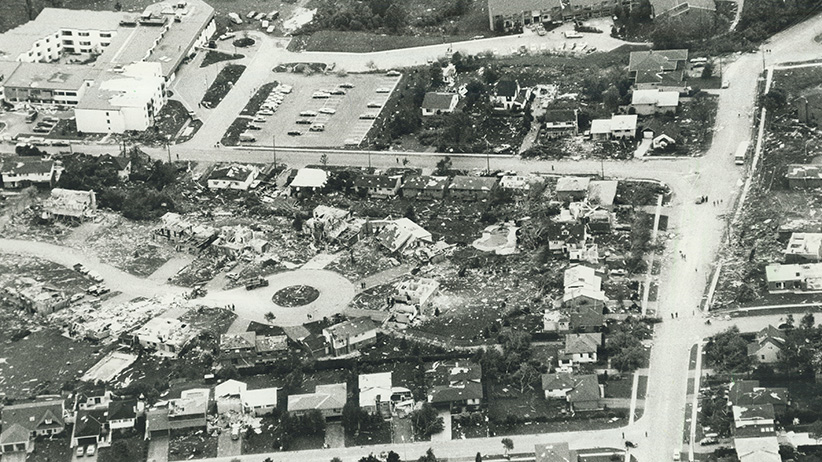‘The sky turned a really strange colour green’
Kevin Shaw was caught in the path of the deadly Barrie tornado
Betty Walsh peers through a broken window into a neighbours cabin on June 3 1985, during a cleanup operation in Barrie, Ont. The cabin was overturned by one of several tornadoes that ripped through southern Ontario north of Toronto, killing a dozen and leaving hundreds homeless. Walsh was blown out of her own home onto her front lawn but was not injured. (Tim Clark/Getty Images)
Share
In May 1985, a tornado ripped through Barrie, Ont., and destroyed Kevin Shaw’s childhood home. Now a software product manager and father of two in Toronto, he recalls the catastrophic event—and how the lessons he learned in the chaos linger more than 30 years later.
It was a Friday. My mom and I were leaving to go to a friend’s cottage, my sister was at ballet practice and my dad was still at work across town. It went from this really bright, blue-sky sunny day to—in the span of a few minutes—this crazy rainstorm. The sky turned a really strange colour of green.
We drove down our street to make our way to the highway—and we actually drove into the tornado. It just went white. The car started to spin. Everything came into the car in slow motion. I jumped from the front seat to the back seat to seek shelter. It felt like half an hour but it was probably 30 seconds.
FROM THE ARCHIVES: In 1985, Maclean’s reports on the devastation in “A Killer Tornado’s Savage Swath”
[widgets_on_pages id=”110-back”]
Then the sky cleared. We were covered in mud and debris, there were massive rocks beside me in the car—and the windows were all smashed in. We were 150 m down the street. There was a bus on its side and it was really quiet. Two teenagers came by in a pickup to see if we were okay. People weren’t really concerned with figuring out what had happened at that point; it was just wanting to assess the amount of damage and make sure people were all right.
We drove around the corner with these two teenagers and they dropped us at our backyard. Our house was completely gone—a 2,500-sq.-foot, two-storey house reduced to a four-foot pile of rubble. There were neighbours looking through the rubble for us. My mom completely melted down. We immediately went into survival mode. I wanted to look for my toys. My mom was looking for clothes. Before we knew it, I heard my dad running up the street through the debris. All the houses had crumbled onto the street, so you couldn’t drive. He gave my mom and me the biggest hug.
We spent the first night at a friend’s house. It was one of a large number of sleepless nights that summer. Our family of four was in one sleeping bag, huddling together, trying to get through the night. That’s when we realized—at least I did—that family was the most important thing.

It was surreal to wake up the next morning and realize this actually happened. Every day for the first week, we’d come back to the house. For a long time, I would build forts and play in the rubble. You had this sense of hope that maybe you’d find something. I remember looking for a certain Tonka truck. But I found just the wheel. These small moments of devastation over and over again. The clothes and things we managed to salvage were unusable.
We rented a one-bedroom chalet at Horseshoe Valley that was my dad’s client’s vacation property. Later in the summer, our parents sent us to camp while they started the process of rebuilding. In the fall of that year, we were able to move back in. It was a great sense of achievement for us.
It’s hard to believe it’s been 31 years. It’s certainly helped me realize possessions aren’t everything. They don’t make up who you are. At any point in time, they can be taken away. It’s how you deal with those adversities that makes you who you are. — Luc Rinaldi
(Portrait by Andrew Tolson)
[widgets_on_pages id=”1970s”]
[widgets_on_pages id=”110-post”]